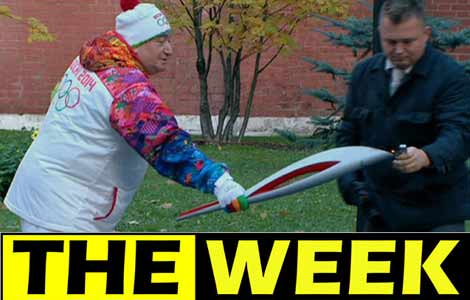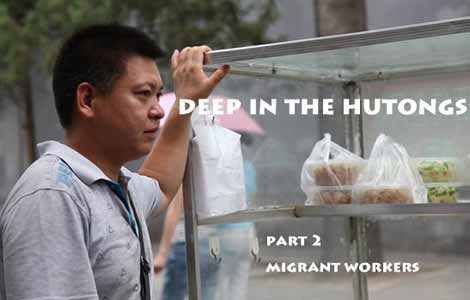Capital to smoke out faulty kitchens
Updated: 2013-10-12 07:28
By Zheng Xin (China Daily)
|
||||||||
Beijing's crackdown on air pollution has a new target: kitchens.
The Chinese capital, which just endured possibly the worst smog in months earlier this week, launched a three-month campaign against restaurant kitchen exhausts, the Beijing Environmental Protection Bureau announced on Friday.
The campaign mainly targets restaurants in downtown Beijing around densely inhabited neighborhoods. The campaign comes after Beijing authorities said they will impose stricter curbs on car use last month.
Indoor restaurants with excessive exhausts will face a fine of up to 3,000 yuan ($490), the bureau said.
Restaurants without proper outdoor exhaust purification equipment will be banned from barbecuing. Violators will face a maximum penalty of 20,000 yuan.
In summer, kitchen exhausts can contribute to 15 to 20 percent of the PM2.5 pollutants in downtown Beijing, according to 2012 research by Wang Yuesi of the Institute of Atmospheric Physics under the Chinese Academy of Sciences. That makes kitchen exhausts the third-largest source of air pollution, after vehicles and pollutants drifting from neighboring areas.
PM2.5 is particulate matter with a diameter less than 2.5 micrometers, which can enter and harm people's lungs.
The components of the restaurant exhausts, high in fine particulate matter, are very complex, consisting mainly of volatile organic compounds. They pose a severe threat to residents' health, especially those who have heart and lung problems, said the research.
Many restaurants' exhaust equipment is not enough, said Wang Chunlin, head of the Beijing Environmental Protection Bureau's pollution prevention and control office.
Even if they have enough equipment, they fail to maintain or use it properly, Wang said.
According to the bureau, the public is quite unhappy about that. Of the 11,437 complaints the bureau received in the first half of this year, 60 percent were about air pollution.
Of the complaints on air quality, exhausts from roadside restaurants came up most often, followed by car exhausts, industrial-waste gas, dust from construction sites and dust from coal-fired boilers.
"Smoke from roadside barbecues is a common source of PM2.5 and poses a serious threat to people's breathing systems," said Pan Xiaochuan, a professor at Peking University's School of Public Health.
Yang Yujie, a 63-year-old resident near Beixinqiao in Beijing's Dongcheng district, a community with many roadside eateries, said: "If you take a stroll after dinner, you will be choked by exhausts from roadside restaurants and outdoor barbecues."
According to the capital's clean-air action plan released last month, restaurants and catering services should have highly efficient exhaust hoods and facilities.
New restaurants cannot open unless they are equipped with exhaust equipment.
The plan also promises to ban all outdoor barbecues in downtown Beijing by the end of this year to cut down on roadside air and noise pollution.

 Chinese education for Thai students
Chinese education for Thai students
 Djokovic retains Shanghai Masters title
Djokovic retains Shanghai Masters title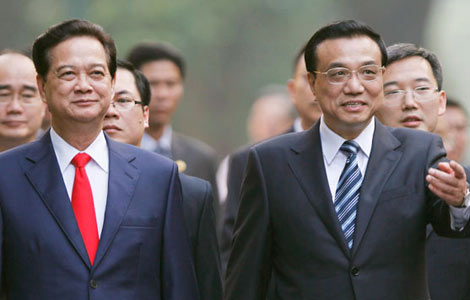
 Working group to discuss sea issues
Working group to discuss sea issues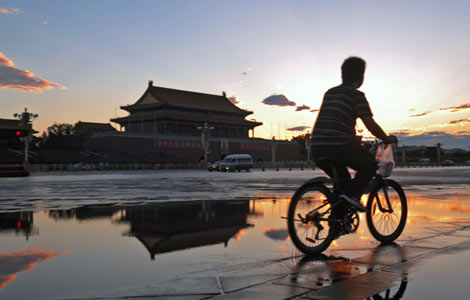
 Draft regulation raises fines for polluters
Draft regulation raises fines for polluters
 Other measures for the capital to become green
Other measures for the capital to become green
 Colombian takes wingsuit crown
Colombian takes wingsuit crown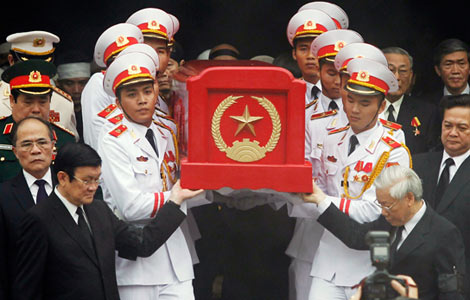
 Vietnam buries heroic general
Vietnam buries heroic general
 Road to clean air starts with new energy vehicles
Road to clean air starts with new energy vehicles
Most Viewed
Editor's Picks

|

|

|

|

|

|
Today's Top News
Chinese firm joins UK airport enterprise
Senate leader 'confident' fiscal crisis can be averted
Working group to discuss sea issues
Man hospitalized years after amputating own leg
Detained US citizen dies in Egypt
Senate leads hunt for shutdown and debt deal
Riding wave of big bargain buy-ups
Draft rule raises fines for polluters
US Weekly

|

|
